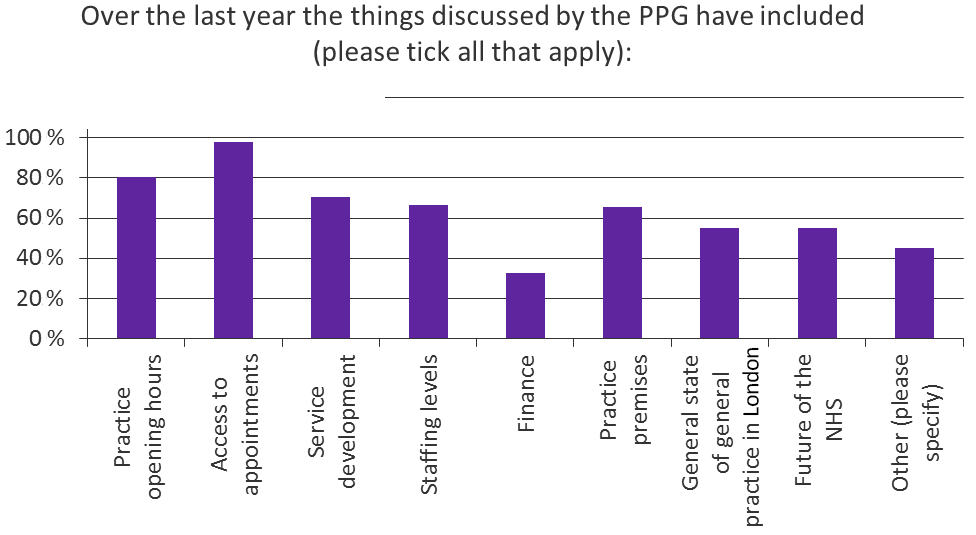Patient engagement survey 2016 - headline findings and key themes
Londonwide LMCs’ Patient Engagement Project started in July 2016. The project aims to support London GP practice teams in working collaboratively with their patients to shape high quality services and secure the future of their practices.
In August and September Londonwide LMCs conducted a patient engagement survey, offering practices the opportunity to help inform our Patient Engagement Project’s development and delivery by sharing their experiences of patient participation groups (PPGs). The survey went to practice leads (the member of staff at the practice responsible for patient engagement) and patient leads (the patient responsible for leading on patient engagement, normally the patient participation group chair). Survey responses illustrated the broad spectrum of practice and patient experience of PPGs across the capital.
- PPGs vary widely in size, in diversity of membership, in whether they meet face to face, virtually, or both.
- The majority of survey respondents reported that their PPG supported their practice and benefited patients, however some respondents were unsure of the impact of their PPG and some practice leads reported their experience of their PPG as entirely negative.
- Common characteristics of effective and active PPGs included an open culture of partnership working between practice and patients, aiming for PPGs inclusive of the diversity of local patient populations and ensuring clearly defined roles and expectations are owned and shared by both practices and patients.
Foundations to build on
Well established groups
- The majority of all survey respondents reported that their PPG had been operating for more than three years.
Increasing patient satisfaction
- 69% of patient lead respondents reported that the work of their PPG had made a positive difference to services received by patients at their practice.
- 60% of the practice lead respondents reported that their PPG positively influenced practice service delivery.
Mobilising patient support
- 59% of the practice lead respondents reported that patient participation was definitely supportive of their practice.
- The state of general practice in London and the future of the NHS were reported by the majority of survey respondents as being on the agenda of their PPG.

Barriers to overcome
Representation
- The main barrier to participation reported by all survey respondents was “lack of patient interest”.
- 45% of the practice lead respondents reported that their PPG was not representative of the demography and diversity of their practice patient population.
Roles and objectives
- 36% of patient lead respondents reported that they were not entirely sure of their role.
Connecting with the system and local partners
- 29% of practice lead respondents reported that they had some support from external agencies in developing their PPG.
Londonwide LMCs’ support
- Sharing survey findings and themes at Londonwide LMCs hosted meetings (e.g Practice Manager Leads Forum) and publications (e.g Londonwide LMCs’ newsletter).
- Delivering a series of workshops for practice leads and their patient leads on reviewing and clarifying the role and purpose of their PPGs; widening the reach and increasing the diversity of PPG membership; practices and PPGs acting together to influence local and Londonwide LMCs’ policy on general practice.
- Working with third sector patient and carer organisations to identify local, Londonwide LMCs and national resources available to support practices and patients in effectively developing their PPGs.
- Producing briefings and templates for practices and patients.
If you would like to know more about Londonwide LMCs’ patient engagement work please email patientengage@lmc.org.uk or sign-up your practice and patient leads to one of our patient engagement workshops.
Last updated : 25 Jan 2017
Mword - Issue 26 - December 2015 now available (22 Dec 2015)
22 December 2015 Christmas 2015 edition Dear Colleague, Christmas is upon us, and trying not to sound...Data protection and your practice - responsibilities and risks workshop for GPs and Practice Staff - February 2016 (14 Dec 2015)
Nursing and Midwifery Council registration fee (10 Dec 2015)
In November Nursing and Midwifery Council registration rukes changed. It is now the case that practice nurses who have not paid their 2015 registration renewal fee and submitted their renewal...LMC Special Crisis Conference (10 Dec 2015)
As you will have seen from Michelle’s M Word 24 and M Word 25 and other communications The General Practitioners Committee (GPC) of the BMA has voted for a Special...Flu guidance update - December 2015 (10 Dec 2015)
Our updated flu guidance can be read here. The latest Department of Health London seasonal influenza bulletin can be read here. Details of our Buying Group's new flu vaccine suppliers...Display Energy Certificate (DEC) - change in requirements (09 Dec 2015)
The Energy Performance of Buildings Regulations 2012 requires Display Energy Certificates (DEC) in public buildings. It covers buildings where the total useful floor area of the building exceeds 250...Buying Group - December 2015 update (09 Dec 2015)
New supplier – Flu vaccine The LMC Buying Group has concluded negotiations with flu vaccine companies for the 2016/17 season and can now announce the joint first preferred suppliers...Courses and training events round-up (09 Dec 2015)
We have recently run the following events and courses to support GP practice staff in meeting the challenges of working in modern general practice. Effective Medical Chaperoning This course was...Avoiding Unplanned Admissions update (09 Dec 2015)
Submitting data for the Avoiding Unplanned Admissions Directed Enhanced Service (DES) The following information has been recieved from NHS England. CQRS (Calculating Quality Reporting Service (CQRS)) has informed NHS England...Guidance
We provide expert guidance for practices in our guidance section, as well as an archive of other materials you may find useful.
GP Support
Contact our GP Support team if you need help or advice.
The team provide professional and pastoral support to GPs and practice teams on a broad range of issues.

